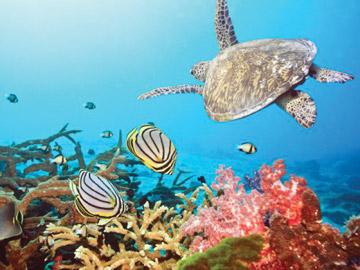Needed: Drastic CO2 cuts to save oceans
by Kitty Stapp
If global carbon dioxide emissions are not dramatically curbed, the
world's oceans - and the many services they provide humanity - will
suffer "massive and mostly irreversible impacts," researchers warned in
Science magazine Friday(9).
 |
|
Ocean acidification results
in significant marine biodiversity loss(sppiblog) |
The report said, impacts on key marine and coastal organisms and
ecosystems are already detectable, and several will face high risk of
impacts well before 2100, even under a low-emissions scenario of warming
below two degrees C."These impacts will occur across all latitudes,
making this a global concern beyond the North-South divide," the report
said.
Twenty-two leading marine scientists collaborated in the synthesis
report. They stress that warming and acidification of surface ocean
waters will increase proportionately as CO2 accumulates in the
atmosphere. Warm-water corals have already been affected, as have
mid-latitude seagrass, high-latitude pteropods and krill, mid-latitude
bivalves and fin fishes.Ocean acidification is especially dire for Small
Island Developing States (SIDS) and people that rely on specific types
of fisheries or organisms for their survival.
Ten years ago, only a handful of researchers were investigating the
biological impacts of ocean acidification. Whilst their results gave
cause for concern, it was clear that more measurements and experiments
were needed.Around a 1000 published studies later, including this latest
in Science magazine, it has now been established that most if not all
marine species will suffer in a high CO2 world, with serious
consequences for human society. The world's oceans have absorbed nearly
a third of the CO2 produced by industrialization since 1750 and over 90
percent of the additional heat.As a result, the report says the
chemistry of the seas is changing faster than at any time since a
cataclysmic natural event known as the Great Dying 250 million years
ago.
Acidification
And as atmospheric CO2 increases, protection, adaptation and repair
options for the ocean become fewer and less effective. "The ocean has
been minimally considered at previous climate negotiations. Our study
provides compelling arguments for a radical change at the UN conference
(in Paris) on climate change," said Jean-Pierre Gattuso, lead author of
the study.Scheduled for November- December is COP21, also known as the
2015 Paris Climate Conference, which, for the first time in over 20
years of UN negotiations, aim to achieve a legally binding and universal
agreement on climate, with the aim of keeping global warming below two
degrees C.
However, even under a scenario of less than two degrees of warming,
many marine ecosystems would still suffer significantly, the report
says, calling for immediate and substantial reduction of CO2 emissions.
- IPS |

